Analysis of Nissan's TQM System Implementation and Challenges Faced
VerifiedAdded on 2023/04/25
|7
|1223
|118
Report
AI Summary
This report provides a detailed analysis of Nissan's implementation of a Total Quality Management (TQM) system. It outlines the steps Nissan took, including identifying the need for change, understanding customer groups, and identifying critical success factors. The report discusses the training and retraining of employees and the development of improvement plans. It also addresses the problems encountered, such as a lack of systematic customer satisfaction measurement, insufficient training, and challenges related to documentation and rigidity. Furthermore, the report highlights the benefits Nissan gained, including cost reduction, improved customer satisfaction, defect reduction, and enhanced employee morale. The analysis includes specific benefits compared to the TQM system, such as reduced costs, increased customer satisfaction, and reduced defects. The report concludes by emphasizing the positive impact of TQM on Nissan's overall business performance and competitiveness. It cites the benefits of the TQM system, such as cost reduction, customer satisfaction, and employee morale.
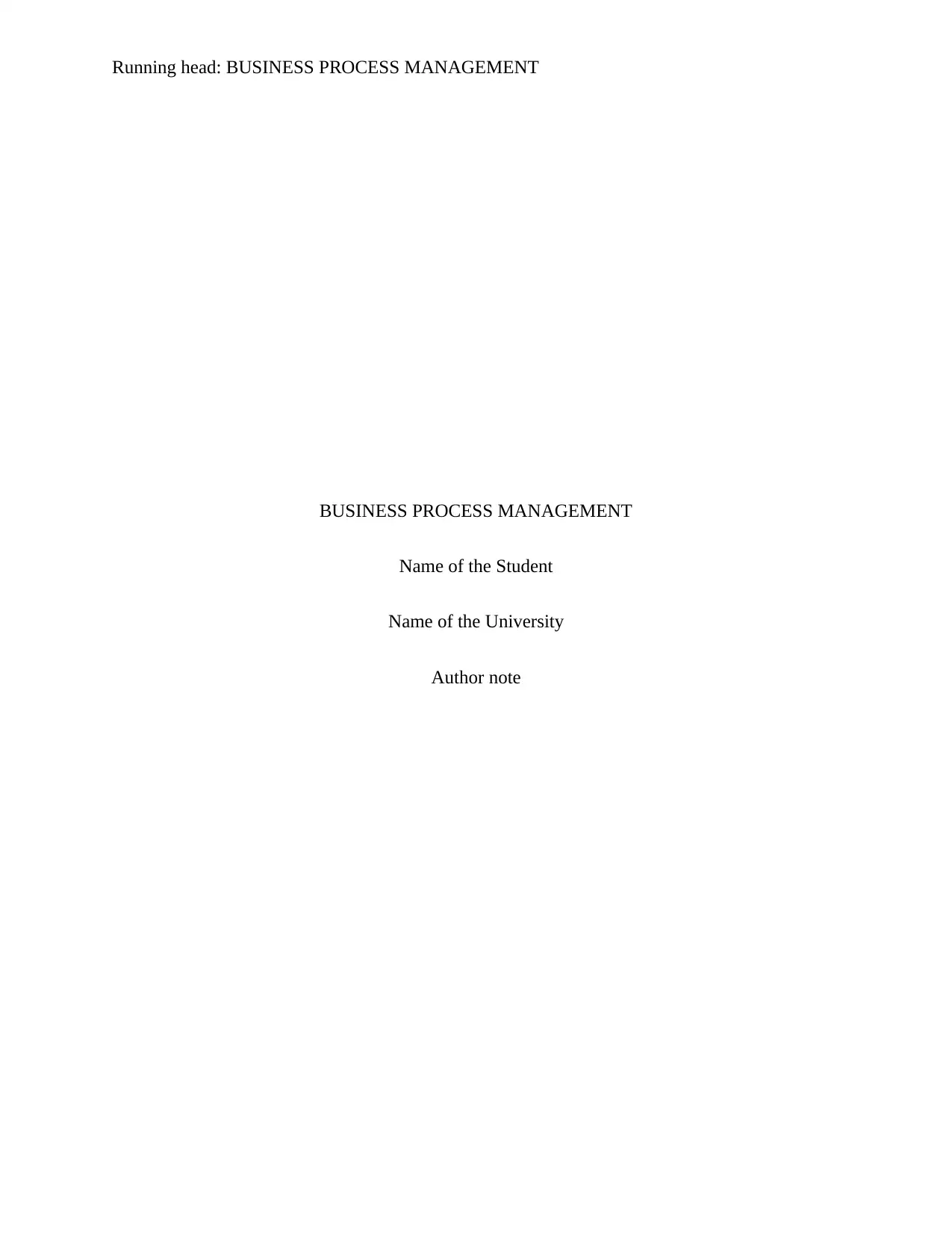
Running head: BUSINESS PROCESS MANAGEMENT
BUSINESS PROCESS MANAGEMENT
Name of the Student
Name of the University
Author note
BUSINESS PROCESS MANAGEMENT
Name of the Student
Name of the University
Author note
Paraphrase This Document
Need a fresh take? Get an instant paraphrase of this document with our AI Paraphraser
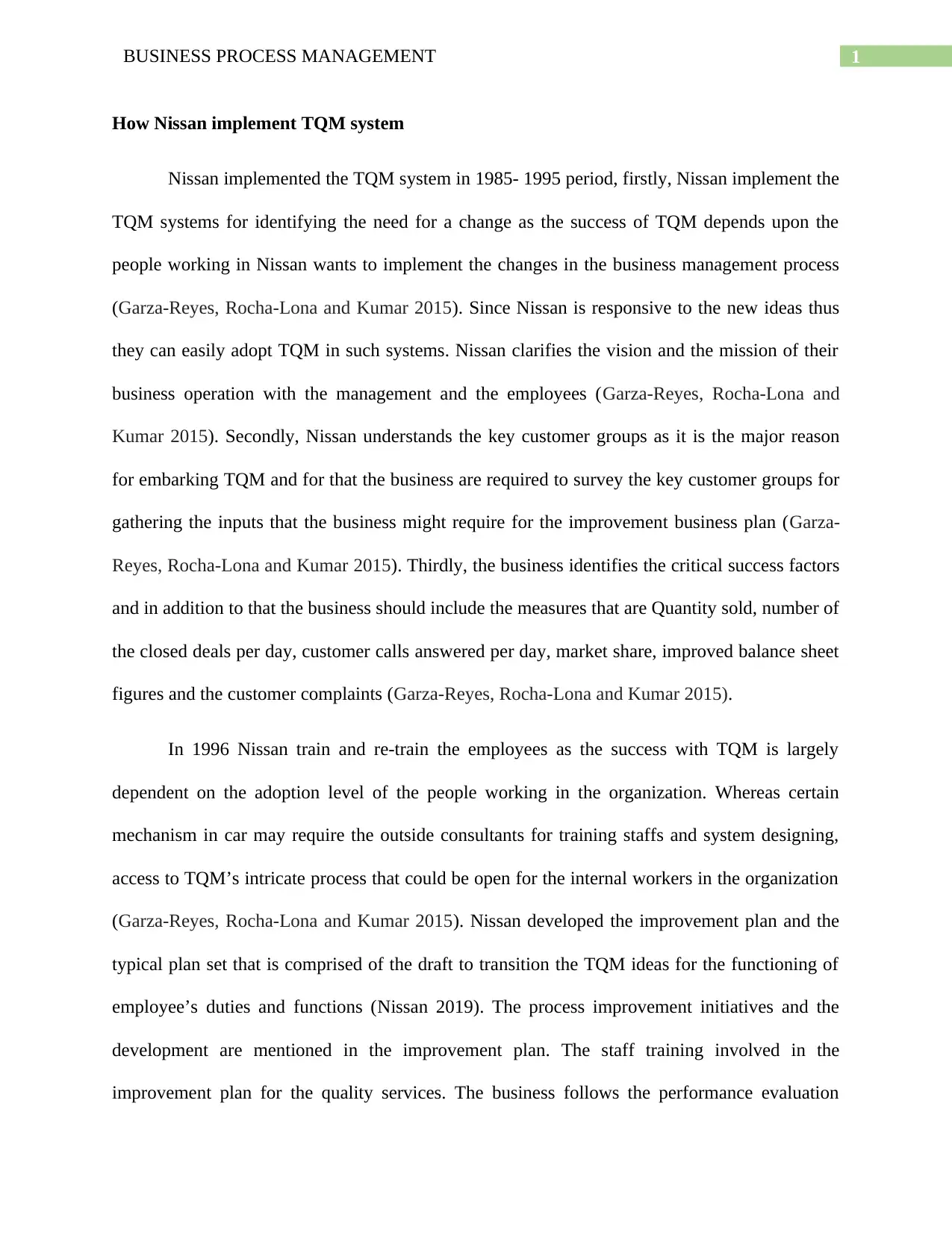
1BUSINESS PROCESS MANAGEMENT
How Nissan implement TQM system
Nissan implemented the TQM system in 1985- 1995 period, firstly, Nissan implement the
TQM systems for identifying the need for a change as the success of TQM depends upon the
people working in Nissan wants to implement the changes in the business management process
(Garza-Reyes, Rocha-Lona and Kumar 2015). Since Nissan is responsive to the new ideas thus
they can easily adopt TQM in such systems. Nissan clarifies the vision and the mission of their
business operation with the management and the employees (Garza-Reyes, Rocha-Lona and
Kumar 2015). Secondly, Nissan understands the key customer groups as it is the major reason
for embarking TQM and for that the business are required to survey the key customer groups for
gathering the inputs that the business might require for the improvement business plan (Garza-
Reyes, Rocha-Lona and Kumar 2015). Thirdly, the business identifies the critical success factors
and in addition to that the business should include the measures that are Quantity sold, number of
the closed deals per day, customer calls answered per day, market share, improved balance sheet
figures and the customer complaints (Garza-Reyes, Rocha-Lona and Kumar 2015).
In 1996 Nissan train and re-train the employees as the success with TQM is largely
dependent on the adoption level of the people working in the organization. Whereas certain
mechanism in car may require the outside consultants for training staffs and system designing,
access to TQM’s intricate process that could be open for the internal workers in the organization
(Garza-Reyes, Rocha-Lona and Kumar 2015). Nissan developed the improvement plan and the
typical plan set that is comprised of the draft to transition the TQM ideas for the functioning of
employee’s duties and functions (Nissan 2019). The process improvement initiatives and the
development are mentioned in the improvement plan. The staff training involved in the
improvement plan for the quality services. The business follows the performance evaluation
How Nissan implement TQM system
Nissan implemented the TQM system in 1985- 1995 period, firstly, Nissan implement the
TQM systems for identifying the need for a change as the success of TQM depends upon the
people working in Nissan wants to implement the changes in the business management process
(Garza-Reyes, Rocha-Lona and Kumar 2015). Since Nissan is responsive to the new ideas thus
they can easily adopt TQM in such systems. Nissan clarifies the vision and the mission of their
business operation with the management and the employees (Garza-Reyes, Rocha-Lona and
Kumar 2015). Secondly, Nissan understands the key customer groups as it is the major reason
for embarking TQM and for that the business are required to survey the key customer groups for
gathering the inputs that the business might require for the improvement business plan (Garza-
Reyes, Rocha-Lona and Kumar 2015). Thirdly, the business identifies the critical success factors
and in addition to that the business should include the measures that are Quantity sold, number of
the closed deals per day, customer calls answered per day, market share, improved balance sheet
figures and the customer complaints (Garza-Reyes, Rocha-Lona and Kumar 2015).
In 1996 Nissan train and re-train the employees as the success with TQM is largely
dependent on the adoption level of the people working in the organization. Whereas certain
mechanism in car may require the outside consultants for training staffs and system designing,
access to TQM’s intricate process that could be open for the internal workers in the organization
(Garza-Reyes, Rocha-Lona and Kumar 2015). Nissan developed the improvement plan and the
typical plan set that is comprised of the draft to transition the TQM ideas for the functioning of
employee’s duties and functions (Nissan 2019). The process improvement initiatives and the
development are mentioned in the improvement plan. The staff training involved in the
improvement plan for the quality services. The business follows the performance evaluation
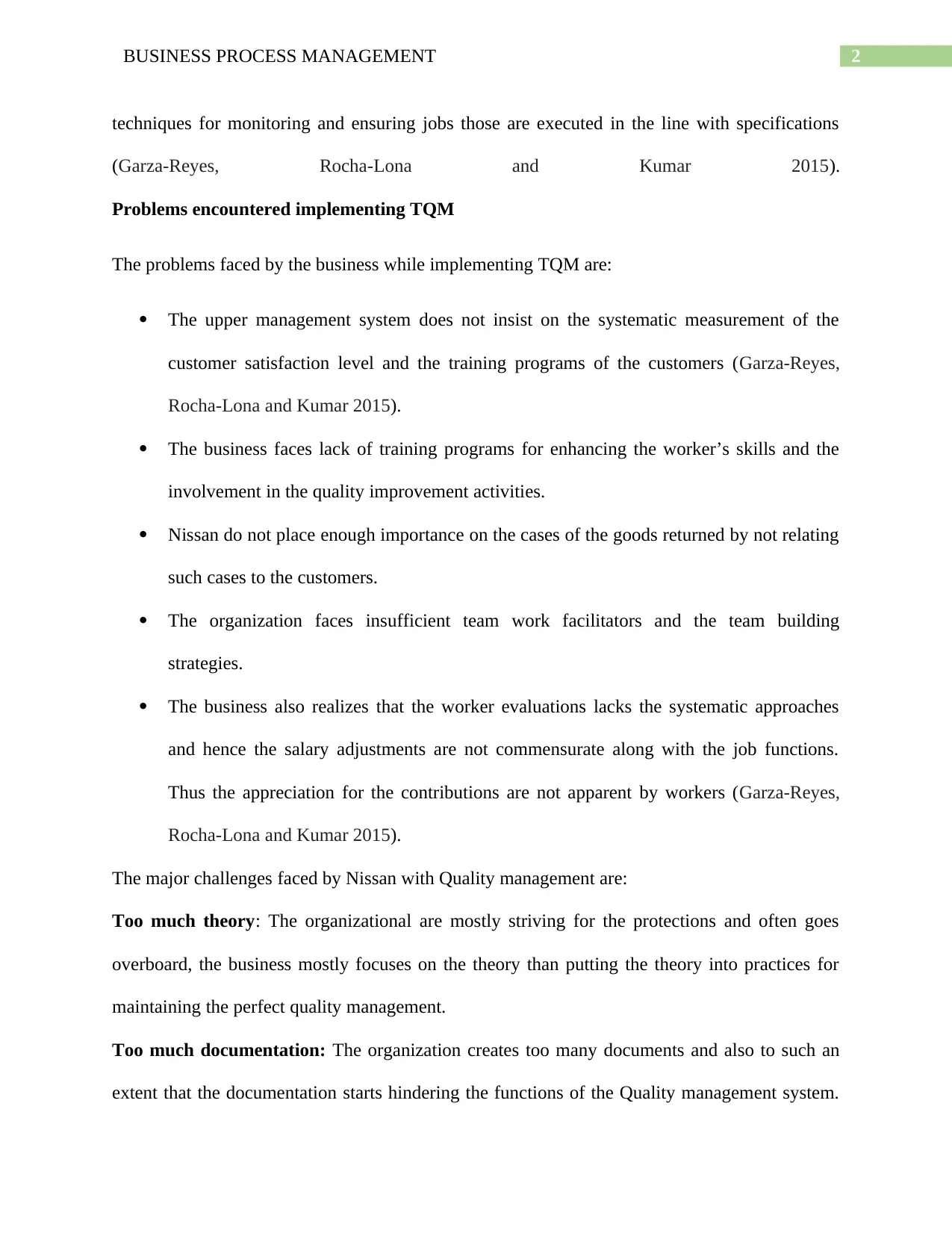
2BUSINESS PROCESS MANAGEMENT
techniques for monitoring and ensuring jobs those are executed in the line with specifications
(Garza-Reyes, Rocha-Lona and Kumar 2015).
Problems encountered implementing TQM
The problems faced by the business while implementing TQM are:
The upper management system does not insist on the systematic measurement of the
customer satisfaction level and the training programs of the customers (Garza-Reyes,
Rocha-Lona and Kumar 2015).
The business faces lack of training programs for enhancing the worker’s skills and the
involvement in the quality improvement activities.
Nissan do not place enough importance on the cases of the goods returned by not relating
such cases to the customers.
The organization faces insufficient team work facilitators and the team building
strategies.
The business also realizes that the worker evaluations lacks the systematic approaches
and hence the salary adjustments are not commensurate along with the job functions.
Thus the appreciation for the contributions are not apparent by workers (Garza-Reyes,
Rocha-Lona and Kumar 2015).
The major challenges faced by Nissan with Quality management are:
Too much theory: The organizational are mostly striving for the protections and often goes
overboard, the business mostly focuses on the theory than putting the theory into practices for
maintaining the perfect quality management.
Too much documentation: The organization creates too many documents and also to such an
extent that the documentation starts hindering the functions of the Quality management system.
techniques for monitoring and ensuring jobs those are executed in the line with specifications
(Garza-Reyes, Rocha-Lona and Kumar 2015).
Problems encountered implementing TQM
The problems faced by the business while implementing TQM are:
The upper management system does not insist on the systematic measurement of the
customer satisfaction level and the training programs of the customers (Garza-Reyes,
Rocha-Lona and Kumar 2015).
The business faces lack of training programs for enhancing the worker’s skills and the
involvement in the quality improvement activities.
Nissan do not place enough importance on the cases of the goods returned by not relating
such cases to the customers.
The organization faces insufficient team work facilitators and the team building
strategies.
The business also realizes that the worker evaluations lacks the systematic approaches
and hence the salary adjustments are not commensurate along with the job functions.
Thus the appreciation for the contributions are not apparent by workers (Garza-Reyes,
Rocha-Lona and Kumar 2015).
The major challenges faced by Nissan with Quality management are:
Too much theory: The organizational are mostly striving for the protections and often goes
overboard, the business mostly focuses on the theory than putting the theory into practices for
maintaining the perfect quality management.
Too much documentation: The organization creates too many documents and also to such an
extent that the documentation starts hindering the functions of the Quality management system.
⊘ This is a preview!⊘
Do you want full access?
Subscribe today to unlock all pages.

Trusted by 1+ million students worldwide
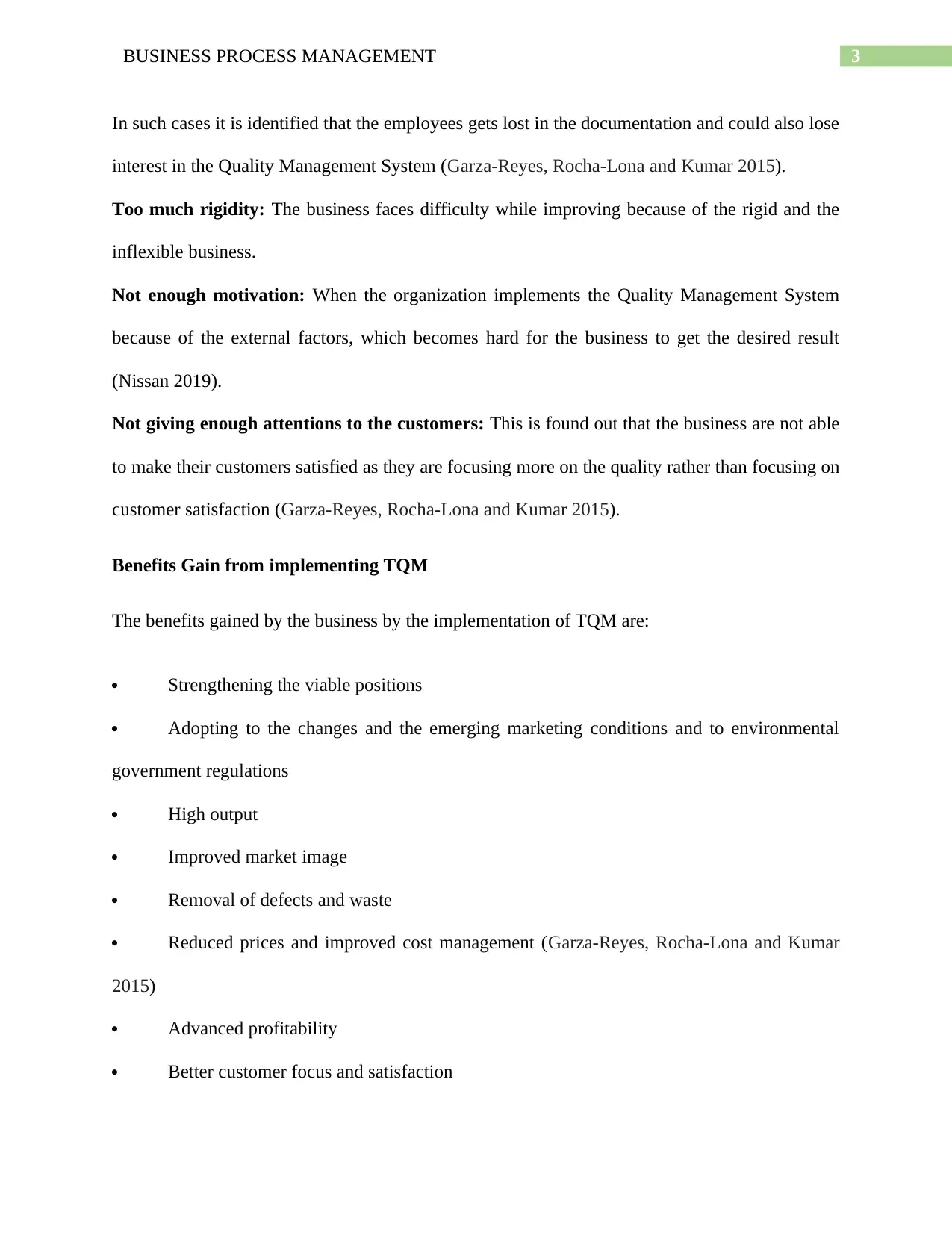
3BUSINESS PROCESS MANAGEMENT
In such cases it is identified that the employees gets lost in the documentation and could also lose
interest in the Quality Management System (Garza-Reyes, Rocha-Lona and Kumar 2015).
Too much rigidity: The business faces difficulty while improving because of the rigid and the
inflexible business.
Not enough motivation: When the organization implements the Quality Management System
because of the external factors, which becomes hard for the business to get the desired result
(Nissan 2019).
Not giving enough attentions to the customers: This is found out that the business are not able
to make their customers satisfied as they are focusing more on the quality rather than focusing on
customer satisfaction (Garza-Reyes, Rocha-Lona and Kumar 2015).
Benefits Gain from implementing TQM
The benefits gained by the business by the implementation of TQM are:
Strengthening the viable positions
Adopting to the changes and the emerging marketing conditions and to environmental
government regulations
High output
Improved market image
Removal of defects and waste
Reduced prices and improved cost management (Garza-Reyes, Rocha-Lona and Kumar
2015)
Advanced profitability
Better customer focus and satisfaction
In such cases it is identified that the employees gets lost in the documentation and could also lose
interest in the Quality Management System (Garza-Reyes, Rocha-Lona and Kumar 2015).
Too much rigidity: The business faces difficulty while improving because of the rigid and the
inflexible business.
Not enough motivation: When the organization implements the Quality Management System
because of the external factors, which becomes hard for the business to get the desired result
(Nissan 2019).
Not giving enough attentions to the customers: This is found out that the business are not able
to make their customers satisfied as they are focusing more on the quality rather than focusing on
customer satisfaction (Garza-Reyes, Rocha-Lona and Kumar 2015).
Benefits Gain from implementing TQM
The benefits gained by the business by the implementation of TQM are:
Strengthening the viable positions
Adopting to the changes and the emerging marketing conditions and to environmental
government regulations
High output
Improved market image
Removal of defects and waste
Reduced prices and improved cost management (Garza-Reyes, Rocha-Lona and Kumar
2015)
Advanced profitability
Better customer focus and satisfaction
Paraphrase This Document
Need a fresh take? Get an instant paraphrase of this document with our AI Paraphraser
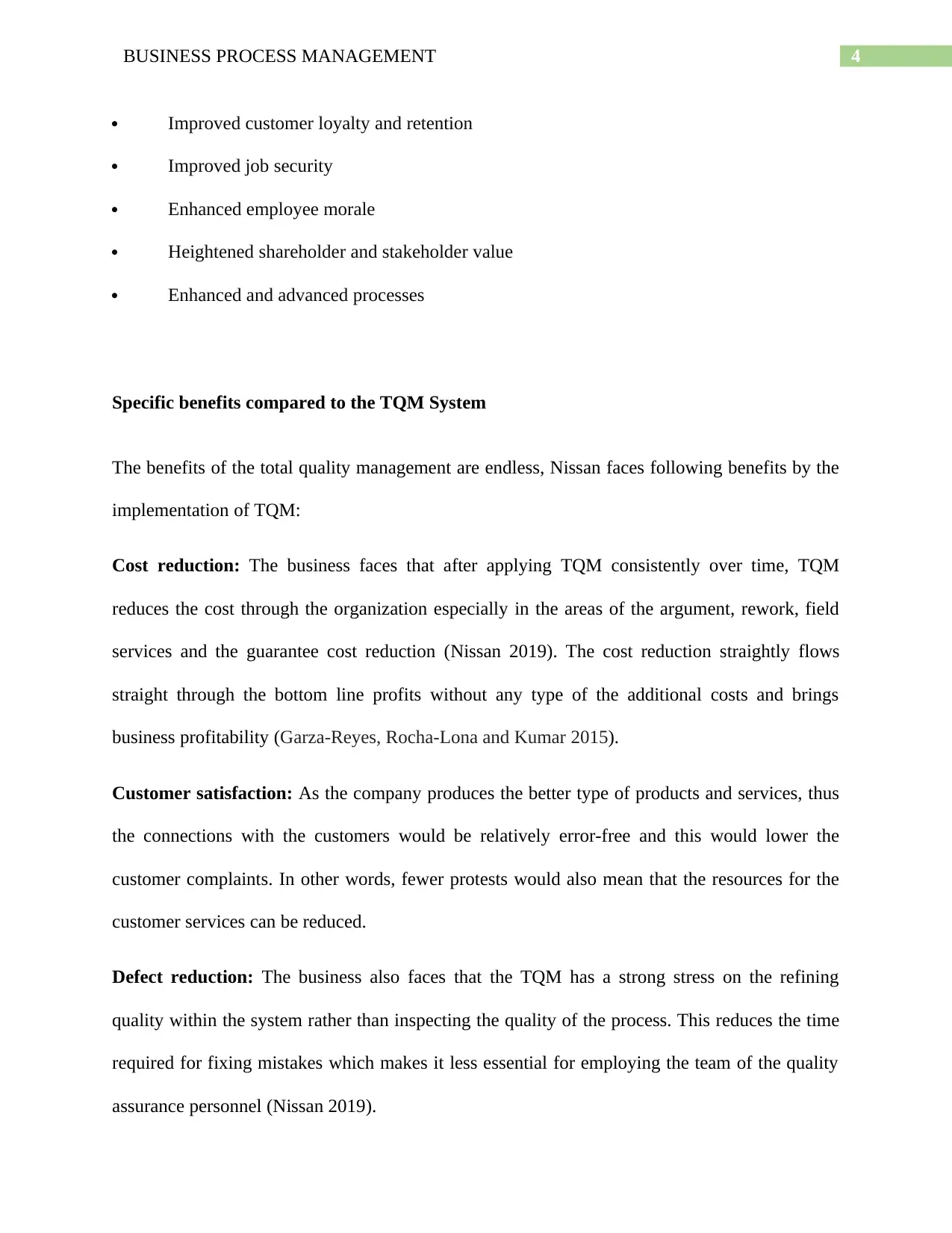
4BUSINESS PROCESS MANAGEMENT
Improved customer loyalty and retention
Improved job security
Enhanced employee morale
Heightened shareholder and stakeholder value
Enhanced and advanced processes
Specific benefits compared to the TQM System
The benefits of the total quality management are endless, Nissan faces following benefits by the
implementation of TQM:
Cost reduction: The business faces that after applying TQM consistently over time, TQM
reduces the cost through the organization especially in the areas of the argument, rework, field
services and the guarantee cost reduction (Nissan 2019). The cost reduction straightly flows
straight through the bottom line profits without any type of the additional costs and brings
business profitability (Garza-Reyes, Rocha-Lona and Kumar 2015).
Customer satisfaction: As the company produces the better type of products and services, thus
the connections with the customers would be relatively error-free and this would lower the
customer complaints. In other words, fewer protests would also mean that the resources for the
customer services can be reduced.
Defect reduction: The business also faces that the TQM has a strong stress on the refining
quality within the system rather than inspecting the quality of the process. This reduces the time
required for fixing mistakes which makes it less essential for employing the team of the quality
assurance personnel (Nissan 2019).
Improved customer loyalty and retention
Improved job security
Enhanced employee morale
Heightened shareholder and stakeholder value
Enhanced and advanced processes
Specific benefits compared to the TQM System
The benefits of the total quality management are endless, Nissan faces following benefits by the
implementation of TQM:
Cost reduction: The business faces that after applying TQM consistently over time, TQM
reduces the cost through the organization especially in the areas of the argument, rework, field
services and the guarantee cost reduction (Nissan 2019). The cost reduction straightly flows
straight through the bottom line profits without any type of the additional costs and brings
business profitability (Garza-Reyes, Rocha-Lona and Kumar 2015).
Customer satisfaction: As the company produces the better type of products and services, thus
the connections with the customers would be relatively error-free and this would lower the
customer complaints. In other words, fewer protests would also mean that the resources for the
customer services can be reduced.
Defect reduction: The business also faces that the TQM has a strong stress on the refining
quality within the system rather than inspecting the quality of the process. This reduces the time
required for fixing mistakes which makes it less essential for employing the team of the quality
assurance personnel (Nissan 2019).
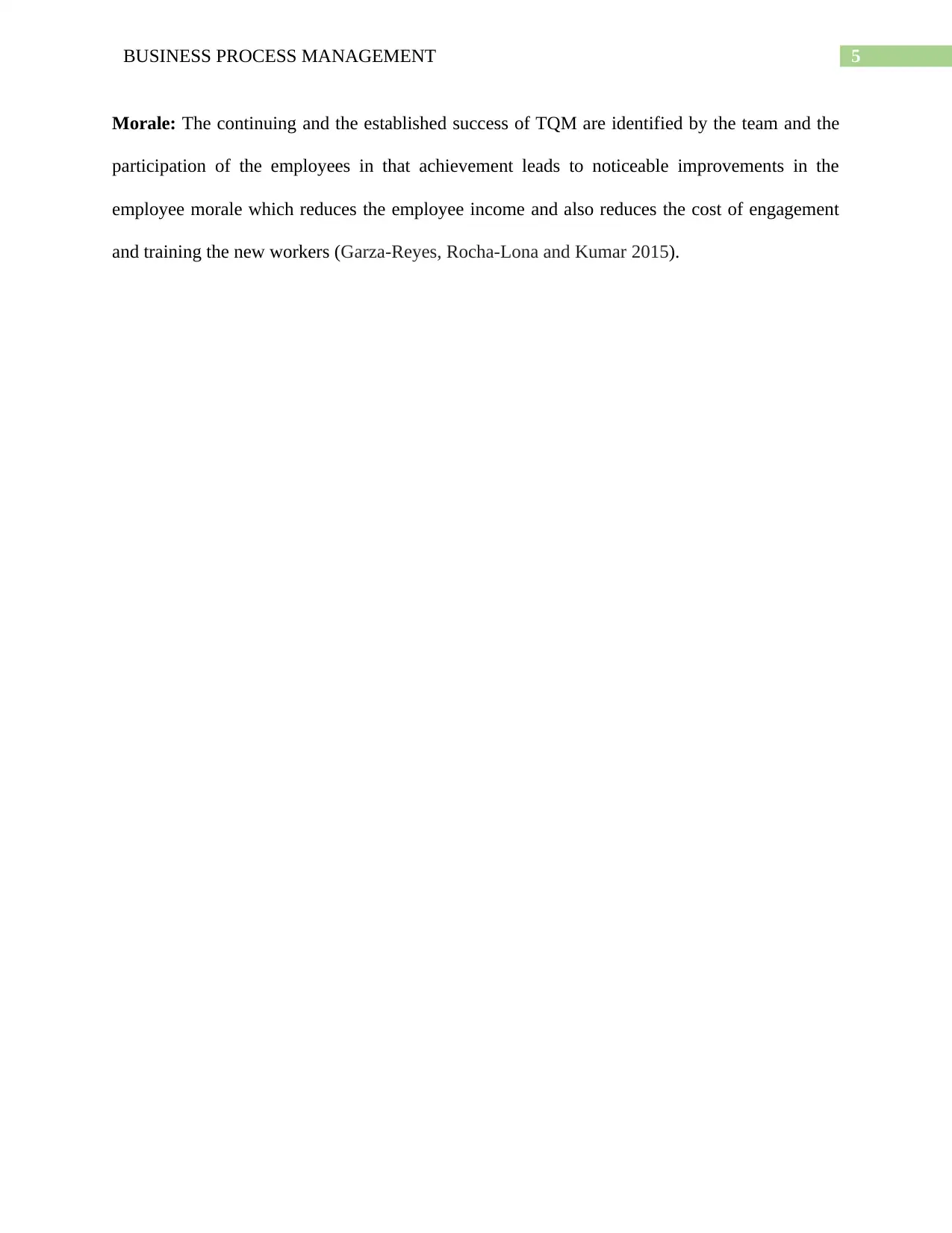
5BUSINESS PROCESS MANAGEMENT
Morale: The continuing and the established success of TQM are identified by the team and the
participation of the employees in that achievement leads to noticeable improvements in the
employee morale which reduces the employee income and also reduces the cost of engagement
and training the new workers (Garza-Reyes, Rocha-Lona and Kumar 2015).
Morale: The continuing and the established success of TQM are identified by the team and the
participation of the employees in that achievement leads to noticeable improvements in the
employee morale which reduces the employee income and also reduces the cost of engagement
and training the new workers (Garza-Reyes, Rocha-Lona and Kumar 2015).
⊘ This is a preview!⊘
Do you want full access?
Subscribe today to unlock all pages.

Trusted by 1+ million students worldwide
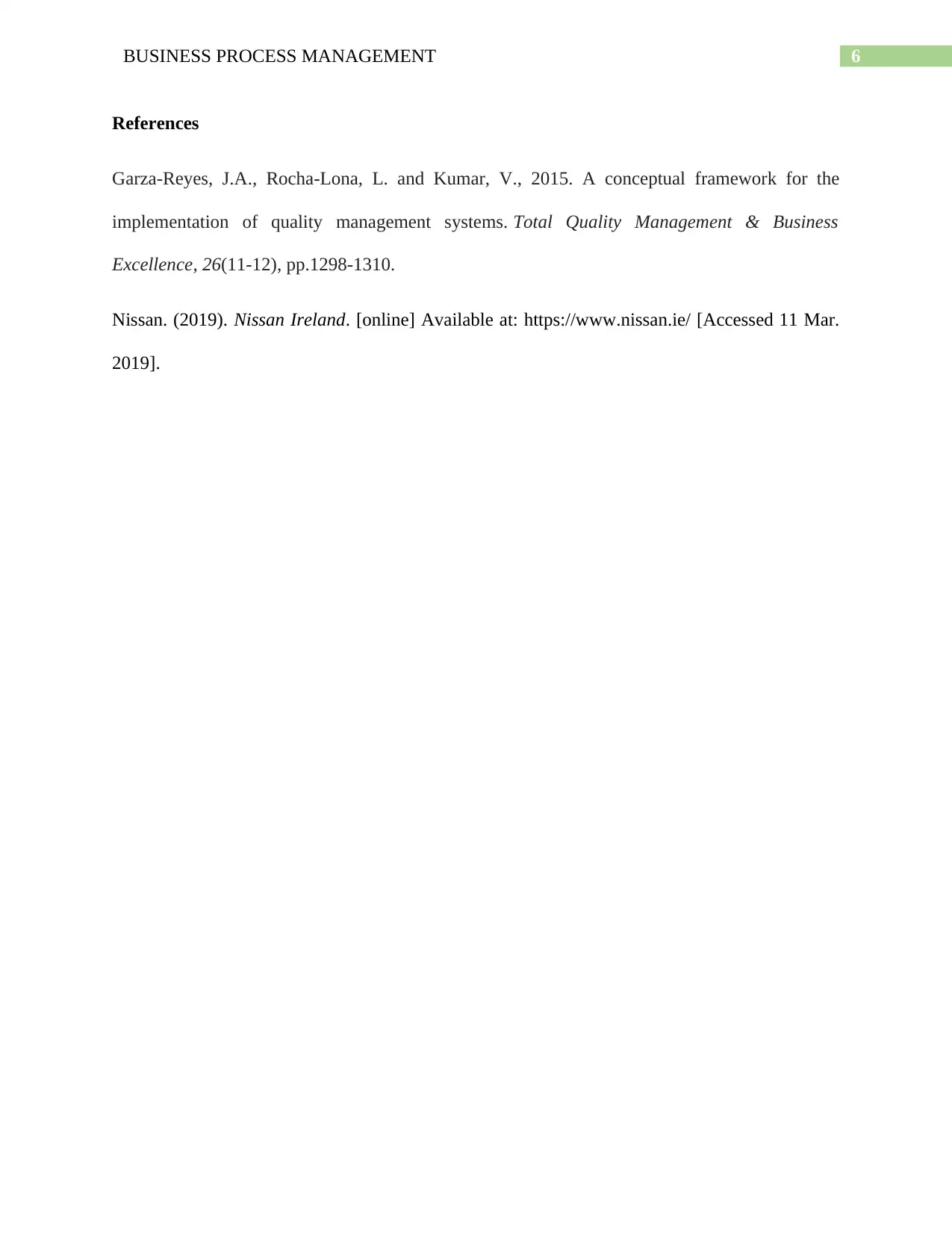
6BUSINESS PROCESS MANAGEMENT
References
Garza-Reyes, J.A., Rocha-Lona, L. and Kumar, V., 2015. A conceptual framework for the
implementation of quality management systems. Total Quality Management & Business
Excellence, 26(11-12), pp.1298-1310.
Nissan. (2019). Nissan Ireland. [online] Available at: https://www.nissan.ie/ [Accessed 11 Mar.
2019].
References
Garza-Reyes, J.A., Rocha-Lona, L. and Kumar, V., 2015. A conceptual framework for the
implementation of quality management systems. Total Quality Management & Business
Excellence, 26(11-12), pp.1298-1310.
Nissan. (2019). Nissan Ireland. [online] Available at: https://www.nissan.ie/ [Accessed 11 Mar.
2019].
1 out of 7
Related Documents
Your All-in-One AI-Powered Toolkit for Academic Success.
+13062052269
info@desklib.com
Available 24*7 on WhatsApp / Email
![[object Object]](/_next/static/media/star-bottom.7253800d.svg)
Unlock your academic potential
Copyright © 2020–2026 A2Z Services. All Rights Reserved. Developed and managed by ZUCOL.




